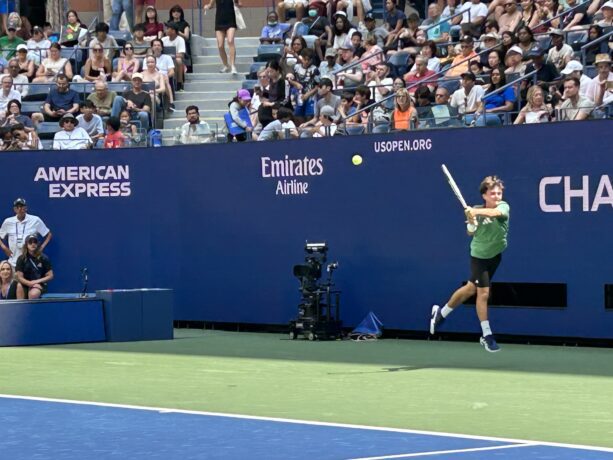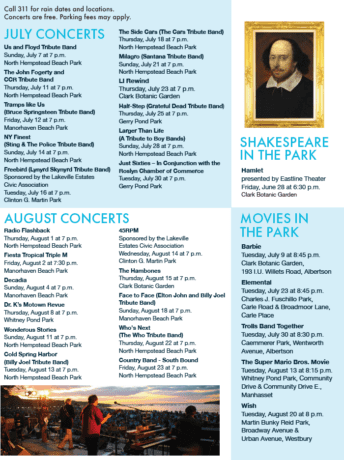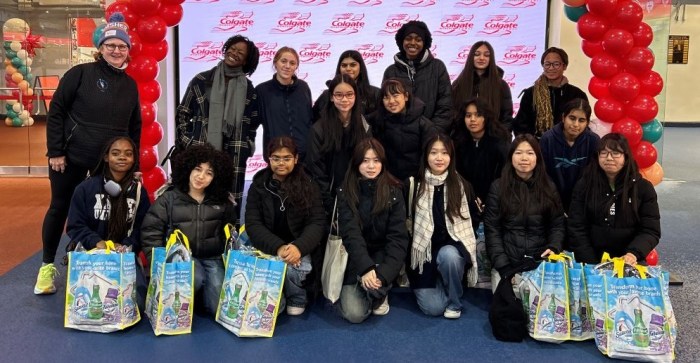It was a small moment, in a couple of days filled with small moments that will live very large in Jack Kennedy’s memory, forever.
Kennedy just turned 16 in June and lives in Huntington, while training at Robbie Wagner Tennis in Glen Cove.
He’s about 5-foot-6, has an easy smile, impeccable manners, and, oh yeah, just played in the U.S. Open men’s qualifying tournament.
About that: Late in his first-round match against Max Marterer, a 29-year-old ranked No. 116 in the world, Kennedy was returning serve when a 122-mile per hour ball blasted by him before he could even move.
The serve was out, but as soon as it was past him on Court 11 Kennedy turned to his family and friends sitting a few feet away and mouthed “Wow.”
Then he smiled, as he did often on Aug. 20 throughout the match, which Kennedy lost, 6-3, 6-4, but played very well and pushed the veteran Marterer.
“Nobody serves 120 in juniors,” he said, laughing. “That was incredible to see.”
The defeat in front of a crowd of about 1,000 people at the Billie Jean King National Tennis Center was the end of a whirlwind few days for Kennedy, as he suddenly found himself walking the grounds of the U.S. Open where he has been coming since he was a little kid. (Well, he’s still a kid, but you know.)
And to prove he really was in the big-time now, immediately after the match Kennedy was whisked away by U.S. Open officials.
His coach, Greg Lumpkin, and parents Bryan and Jeannie looked puzzled: Then they were told Kennedy was chosen for a random drug test.
“Yeah that was a new one for me,” Kennedy said. “But hey, it’s just one more way to get introduced to life in the pros.”
Another nice introduction came a day earlier. When Kennedy found out he’d be playing a lefty in the first round, he and Lumpkin asked around with tournament officials to see if there was a southpaw pro they could hit with on Monday.
As a matter of fact, there was. Former Top 10 player and Wimbledon semifinalist Denis Shapovalov was available, and hey, how about hitting on Arthur Ashe Stadium?
And so in front of several hundred people on Monday afternoon, Kennedy traded groundstrokes and laughs with a star player on the biggest tennis court in the world.
“Just an unbelievable experience for him, doing that and all of this that’s happened,” Bryan Kennedy said. “Couldn’t be prouder of him, and this experience will help him so much.”
“That was just once in a lifetime kind of thing, to hit on Ashe,” Kennedy said. “I was looking around at how big the stadium was, and that I would sit there (in the stands) just a few years ago. And now I was playing in it!”
It has been a whirlwind couple of months for Kennedy and his parents, Bryan and Jeannie. (For the record, he was not named after the former President; Bryan and Jannie both love the name Jack, that’s all).
Kennedy has been a fast-riser up the junior ranks the last two years, as his all-court game, speed and defense have helped him tremendously against bigger, stronger opponents.
Kennedy played Junior Wimbledon and Junior Roland Garros this year, losing in the first round in both, but was racking up points by winning or getting to the finals of juniors tournaments.
Then In early August he arrived in Kalamazoo, Mich., the site of the most prestigious tournament for American boys: The USTA Nationals, where the winner of the Boys 18s division gets an automatic spot in the U.S. Open men’s draw, and the losing finalist gets a spot in the qualifying.
Seeded No. 6, Kennedy tore through the draw, winning seven matches, including a victory over top seed Trevor Svajda in the semifinals.
Facing 18-year-old Michigan State freshman Matthew Forbes in a best-of-five final, Kennedy dropped the first two sets, battled back but ultimately lost in four, with the match lasting nearly four hours.
“You look around that place and see the guys who’ve won it, like Tiafoe, and Roddick, and you think it would be amazing to be up there with them,” Kennedy said. “I was definitely feeling fatigued toward the end, but Matt played great and deserved to win it. And getting to play in qualifying is amazing.”
Lumpkin, who formerly coached at John McEnroe Tennis Academy before moving to Robbie Wagner a year ago, said Kennedy’s improvements this year have been slow and steady.
“He’s just stayed focus and stayed to his routines and just played great all year,” said Lumpkin, who has worked with Kennedy for nine years. “He’s a kid who picks things up very quickly, and processes information during match super-fast. Give him five or ten minutes and he’ll find a player’s weakness right away.”
For his efforts at the Open, Kennedy earned $25,000, but he is only allowed to keep a portion of it to maintain his college eligibility.
And college tennis is definitely in the plans for now, Kennedy and his parents say. He continues to train with Lumpkin and with U.S. Tennis Association coach Jose Caballero, who travels to international tournaments with Kennedy.
“My mom is a guidance counselor, she really wants me to get a college education,” Kennedy said. “And right now lots of coaches have reached out and I’m going to take my time to figure out what’s best for me.
“But I’m not thinking too far ahead. This week has just been so incredible and I’ve really enjoyed it.”



























